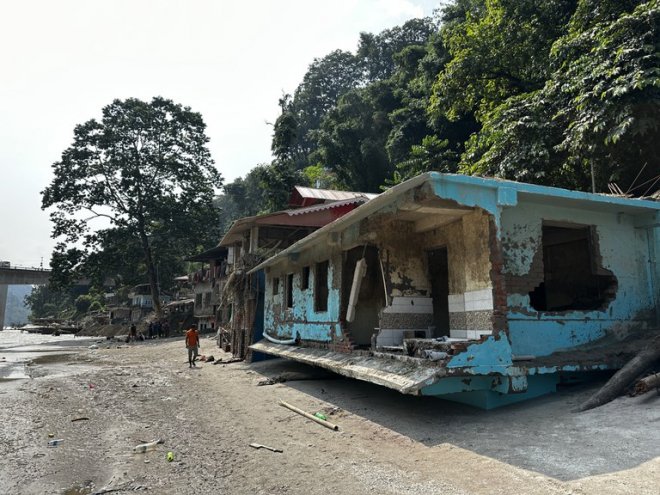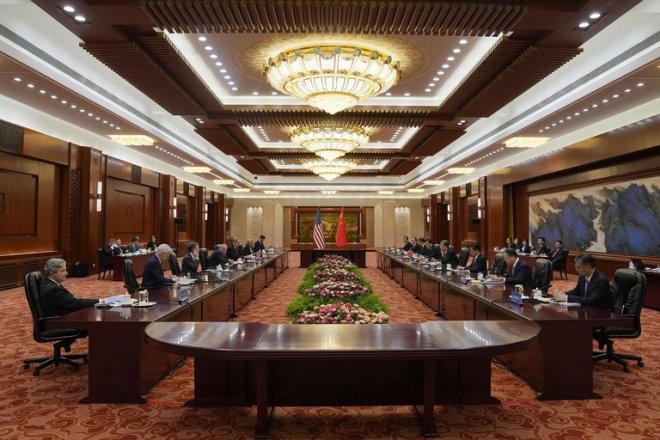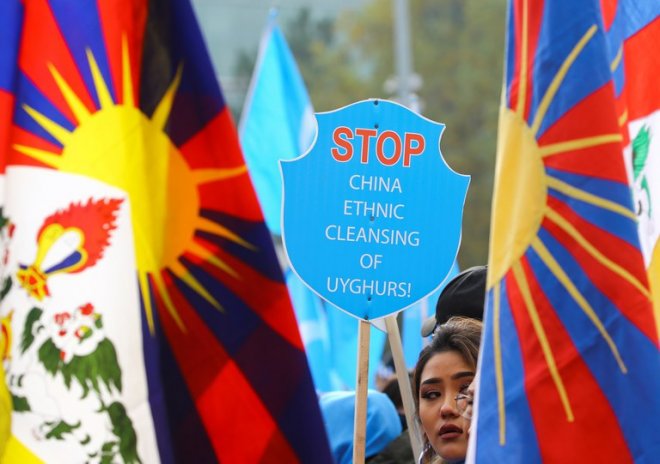Junta ban on private oil wells could affect 300,000 owners and workers
Myanmar’s junta last week issued an order shutting down all privately operated oil wells in a the central Magway region, a move that could affect as many as 300,000 workers in the industry.The decree, which came with no prior warning and provided no reason for the closure, immediately forced entrepreneurs in the oil fields in Magway’s Min Hla and Thayet townships to cease production and walk away from their wells.
Oil well owners and workers told Radio Free Asia that the military ordered the closure out of fear that tax revenues from the operations are being used to fund People’s Defense Force paramilitary groups fighting the military, which took control of the country in a 2021 coup.
Among those impacted by the ban was a businessman who had invested 40 million kyats (US$19,000) in three oil fields.
“I have lost a lot at the Da Hat Pin oil field in Min Hla township, where I am currently based,” said the businessman who, like other oil well owners interviewed for this article, spoke to RFA Burmese on condition of anonymity, citing security concerns. “I didn"t even have any money left for food at the Na Lal oil field.”
The businessman said that after the fields where he runs wells were shut down by the junta he “lost everything that I invested,” leaving him broke.
The third well he ran is located in the Tet Ma oil field in Mandalay’s Nyaung-U township, where officials shut down operations on May 21 after having issued a notice the previous day at the behest of the township junta. The notice threatened “serious action against anyone who fails to comply with the prohibition.”
“I have nothing left,” he said.
Those who only lost their source of income as a result of the shutdown can be considered relatively lucky. Others have lost their life savings or taken on debt to fund their entry into the industry and now find themselves in a very different hole than the ones they dug in search of oil.
Another businessman who invested 42 million kyats (US$20,000), including a loan of 20 million kyats (US$9,500), to start up his wells on Oct. 1 last year said he has since lost all of it and now is facing an insurmountable debt.
“I will never be able to pay back this loan by working in the plantations now that the oil wells have been shut down,” he said. “If I can’t continue my oil well this year, I will never be able to pay back this loan in my lifetime.”
The businessman likened the oil well closures to “killing us.”
“Not just me – over 100,000 workers and their families have been affected by the shutdown,” he said. “I am really upset but I can’t do anything about it. I had to stop working and return home as they ordered.”
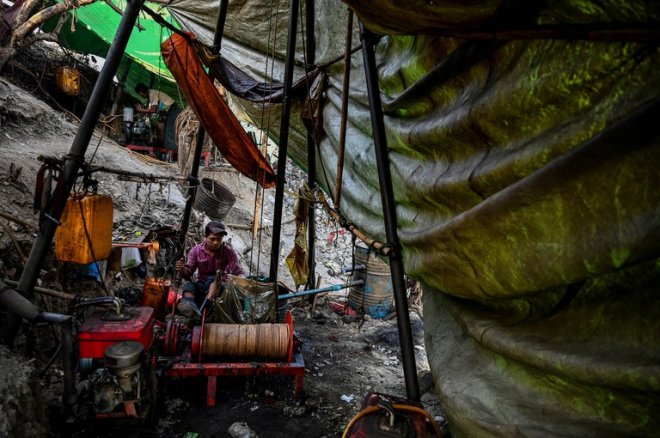 A worker mans a hand operated-machine to extract crude oil from a well at an informal oil field in Minhla township, central Myanmar. Military junta shut down privately-owned hand dug oil wells in fear that revenue would fund the anti-junta militia People’s Defense Forces, according to oil well owners and workers. Credit: Ye Aung Thu/AFP
A worker mans a hand operated-machine to extract crude oil from a well at an informal oil field in Minhla township, central Myanmar. Military junta shut down privately-owned hand dug oil wells in fear that revenue would fund the anti-junta militia People’s Defense Forces, according to oil well owners and workers. Credit: Ye Aung Thu/AFPHe said the junta had caught oil well owners flat footed with the sudden closures, including those who had invested “hundreds of millions” of kyats in their operations.
Wells left unattended can be rendered inoperable, and owners said they are desperately waiting to learn whether they will be able to restart production.
Tax revenue under scrutiny
Bagan Gyi, a soldier with the anti-junta Nyaung-U People"s Defense Force, said that the closure of the Tet Ma oil fields has choked off the local economy.
“Many surrounding villages rely on the oil field for their livelihoods,” he said. “The junta has shut down their economy with this closure … [It’s a] deliberate attempt to make people suffer.”
Bagan Gyi also said he believes that the junta shut down the oil field to cut off funding to the PDF. He did not provide a definitive answer when asked whether the PDF is receiving tax money from the region’s oil well businesses.
But a resident of Magway’s Myaing township with ties to the oil industry said that the PDF does receive funding from its taxation, which is why the junta recently ordered the closure of private wells there and in nearby Pauk township.
“The PDF even has some oil wells of their own and they derive income from the wells in other ways, too,” the resident said. “What I am confident to say is that the military must have calculated that the PDF business transactions would stop if the oil fields were shut down.”
Residents of Magway said that junta troops conducting clearing operations in the region have set fire to private oil wells, while PDF groups have also attacked military units stationed at oil fields.
More closures likely
Deputy Information Minister Major Gen. Zaw Min Tun did not respond to RFA inquiries about the oil well closures by the time of publication.
But Thein Tun Oo, executive director of Thayninga Institute for Strategic Studies, made up of former military officers, said it came as no surprise that the junta shuttered the oil fields in Magway.
“If the military assumes that revenue from oil fields is funding the PDF, they will definitely be shut down,” he said. “Any government would work to prevent local businesses from funding illegal terrorist organizations.”
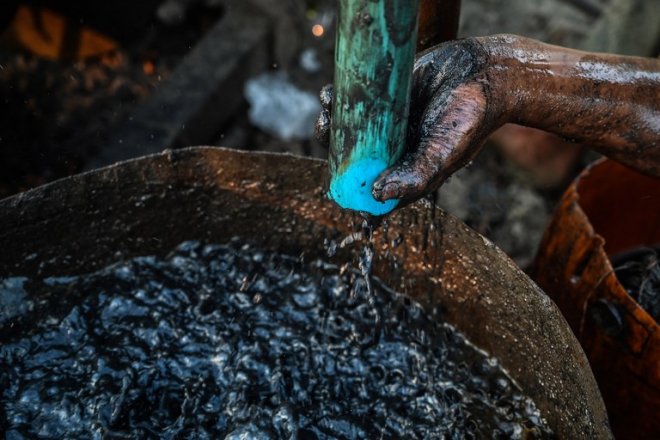 A man collects crude oil from a well at an informal oil field in Minhla township, central Myanmar, March 10, 2019. Credit: Ye Aung Thu/AFP
A man collects crude oil from a well at an informal oil field in Minhla township, central Myanmar, March 10, 2019. Credit: Ye Aung Thu/AFPThein Tun Oo said he expects the junta to close more oil fields used for private wells going forward, adding that authorities in countries under martial law may restrict the rights and properties of the people if they are deemed to contribute to a “national emergency.”
Meanwhile, private oil well owners who, in some cases, entered the industry only months earlier to escape escalating costs and irregular weather conditions affecting agricultural work are suddenly finding themselves out of work and mired in debt due to the ban.
“Soon after I bought two wells and extracted some oil to sell, I now have to return home, leaving everything I invested,” said a businesswoman who spent 20 million kyats on her operations, but only earned around 3 million kyats (US$1,430) before the closure.
“People from my area have invested tens of millions of kyats in this business and they are all devastated now that the oil fields have been shut down and they are left with nothing.”
Translated by Myo Min Aung. Edited by Joshua Lipes and Malcolm Foster.
[圖擷取自網路,如有疑問請私訊]
|
本篇 |
不想錯過? 請追蹤FB專頁! |
| 喜歡這篇嗎?快分享吧! |
相關文章
AsianNewsCast








